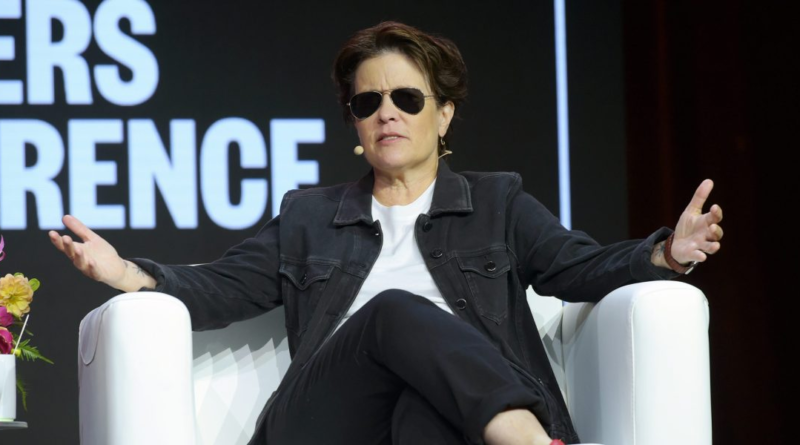In a new memoir, veteran tech journalist Kara Swisher takes the industry she ‘loves’ to task. ‘I don’t like what you’ve done with the place’
At a baby shower for Google cofounder Sergey Brin and 23andMe cofounder and CEO Anne Wojcicki in 2008, all attendees were required to wear either an adult-sized onesie or a large diaper complete with “an oversized comical pin.” Guests were to accessorize with either a baby bonnet or a pacifier.
Only two guests declined to dress up: renowned tech reporter Kara Swisher, and future California governor Gavin Newsom, according to Swisher’s new memoir Burn Book: A Tech Love Story, which details her 35-year career as a tech reporter.
To celebrate their shared nonconformity, Swisher and Newsom decided a toast was in order. They mozied over to an ice sculpture of a woman whose breasts squirted out White Russians to fill their cups. The two did so, clinked their glasses, and laughed “at the ridiculousness of these people.” And with that small vignette of a plugged-in tech reporter and an ambitious politician sipping Kahlua at a tech billionaire’s baby shower, Swisher offers the archetypal peek behind the curtain of Silicon Valley’s elite.
However, where exactly Swisher stands in relation to that curtain is murky.
Whether she’s operating behind the scenes, seated in the audience, or perhaps part of the main attraction herself may be unclear to the reader. Certainly she was onstage, although rarely the main attraction, at the many conferences she founded and hosted over the years, like All Things D and the Code Conference. She started her career as a humble and nameless tech reporter on a beat that many of her colleagues either scoffed at or barely knew existed. Hardly the prerequisites for fame and prestige.
When Swisher was at the Washington Post in the late ‘90s, she remembers telling the paper’s owner Don Graham that the flood of the internet was coming. “You better stay dry then,” Graham joked.
Swisher’s stature grew over the years, and with it, that of the countless tech executives she covered, like Mark Zuckerberg, Jeff Bezos, Steve Jobs, and Elon Musk to name but a few. Eventually she evolved from cub reporter relegated to the “internet beat” to a media figure, to a sometimes confidant of tech executives.
What Burn Book makes clear is that just like microprocessors, oddball founders, and VC pitch decks, Swisher is part of the firmament of the technology industry. Like it or not, Kara Swisher is tech.
“I had clearly been infected by some of the entrepreneurial spirit of the people I had been covering, and I was becoming increasingly grumpy at the [Wall Street Journal], which I had started to think of as a velvet coffin,” Swisher writes of her decision to leave the Wall Street Journal to start her own business alongside her mentor Walt Mossberg. (Swisher dedicated the book to him.) “The idea of being trapped in a box was a metaphor that resonated with me. I had fully soaked up another trait of Silicon Valley: the need for next.”
Her work informs much of how the public thinks about technology. She exerted uncommon influence for a journalist over the industry’s greatest leaders, and used her own natural talent and dislike for incompetent authority figures to shake up a stodgy, change-averse industry—journalism—in her own right.
‘I don’t like what you’ve done with the place’
The start of her career in journalism was spent trying to convince editors who were predictably arrogant and seemingly pathologically averse to innovation that email was useful, putting articles on the internet was a worthwhile endeavor, and perhaps, most presciently, that if they did nothing about tech those computer nerds would eat their lunch. Thirty years later, email is still practical, every news outlet is “still trying to figure out digital,” and the dweebs in hoodies turned out to be corporate killers in sustainably crafted Dutch basics. (Now some of them personally own those publications).
There was “a persistent attitude in the media for far too long that they could copy [tech] and that it was easy—which it is not,” Swisher says.
From the beginning of her career, Swisher was animated by the understanding that technology only moves in one direction—forward. In the ’90s and early 2000s, Swisher understood that no amount of complaining by (literally) ink-stained journalists would stop the digitization of all content. Swisher didn’t fight the trend, wishing it away as many in journalism did at the time, (and now do again with AI), according to Burn Book. Instead, Swisher embraced it.
“I love tech,” Swisher says. She is, though, “not stupid to the dangers.”
In fact, her belief that tech’s “possibilities are endless” led to her industry coverage as its star beat reporter. Then, through her own bit of mimicked entrepreneurship, she became its spokesperson through her series of conferences, before settling in as the éminence grise who dispenses both judgment and wisdom to the masses.
“The expression I use is ‘I don’t like what they’ve done with the place.’” she says. “I have such hopes for tech.”
Perhaps it is that unabashed love of what she covers that has raised eyebrows about her viability as a neutral arbiter of the tech industry. Swisher developed a reputation as a consummate insider in the industry. Much of her insider status came in the pursuit of her stellar reporting. She broke countless scoops over her decades-long career: that a bright young Google executive named Sheryl Sandberg was joining Facebook; that Disney was considering acquiring Twitter; and that Uber had hired Dara Khosrowshahi as its next CEO. (The last one broke the news even to Khosrowshahi himself).
Growing up alongside tech billionaires
Throughout Burn Book there are several examples of her up-close-and-personal experiences with tech’s most prominent figures. She is explicit, though, that the people she covers are not her friends.
Google cofounders Sergey Brin and Larry Page once spent the night at her mother’s apartment in New York because of an elevator malfunction at their hotel. (Spare a thought for Swisher’s then-wife who was a Google employee at the time and had to have a sleepover with her boss’s, boss’s, boss … at her mother-in-law’s house no less). At a party in 1999, Swisher had a conversation about same-sex parenthood with an earnestly curious Jeff Bezos, according to Burn Book. The exchange was later leaked to Page Six, which speculated Bezos might be the father of Swisher’s child.
Swisher makes no apologies for how close she got to the people she covered, attributing to being in the right place at the right time as her career grew in parallel to theirs.
“I got lucky because I got there before they were all famous,” Swisher says about the tech executives she covered. “I was there when Google was in a garage. Nobody at the Wall Street Journal [where Swisher worked] was really paying attention to these people, except me.”
The rest was down to reporting chops. “I also spent a lot of time cultivating relationships,” she says. “If you’re the first person Jeff Bezos deals with, you have better access.”
What also may ruffle some feathers is that Swisher admits, both in Burn Book and her many other media appearances, that she likes some of the executives she covers. LinkedIn cofounder Reid Hoffman, Snap CEO Evan Spiegel, and former AOL CEO Steve Case are just a few executives Swishers classifies as mensches. It is taboo for a journalist to say they “like” someone they cover, making Swisher’s admission a small act of courage, rather than a large one of obsequiousness.
Even now, as she watches the founders she started covering from the garage turn over the reins of their company to a new generation of leaders, Swisher knows the nature of Silicon Valley means their perches atop the industry are far from secure. In fact, she hopes the advent of AI will usher in a new coterie of companies and leaders.
“I hope there’s some company we haven’t ever met, who’s going to clean all their clocks,” Swisher says. “That’s my hope. I love when everybody’s clocks get cleaned by a new fresh startup with a new idea. That’s my favorite part of tech.”
But if spending time with her sources “in their natural habitat,” as she likes to call it, is unequivocally part of a journalist’s job, other parts of Swisher’s career mirror those of a tech luminary, but not necessarily reporter. Eventually her network of sources became so extensive, tech moguls would call her for advice. Throughout Burn Book she recounts regularly offering advice to various executives. Rupert Murdoch used to call her to try and glean inside information about the tech companies she covered. Swisher once advised Yahoo chief Jerry Yang to end the company’s partnership with nascent search engine company Google.
Nonetheless, at a certain point Swisher started to sense that she “had become too much a creature of” Silicon Valley. In 2020, Swisher decamped for Washington D.C. for a change of scenery. It didn’t hurt that doing so made it easier to “to forge relationships with government officials” that would determine the new spate of tech regulations that were gaining support among elected officials.
For all the quibbles about her style and level of access, there is one thing that is beyond reproach: the work. Swisher’s towering career and monumental achievements warrant scrutiny rather than inure her from it. In this she is also like the tech companies and their products.
In Burn Book she offers the quintessential explanation of why the tech industry and its power players can have such far-reaching effects on the daily lives of the people who use their products. “Who makes products and what characteristics they have matters a great deal as to how products turn out— especially when those products become damaging,” Swisher writes.
As right as Swisher is, perhaps it would be appropriate to apply the same consideration to her, the journalist whose reporting more than any other has shaped how the public views these tech products. The work is great. But how did it come to be? Has it had any unintended consequences?
Nothing a dogged reporter couldn’t figure out.




